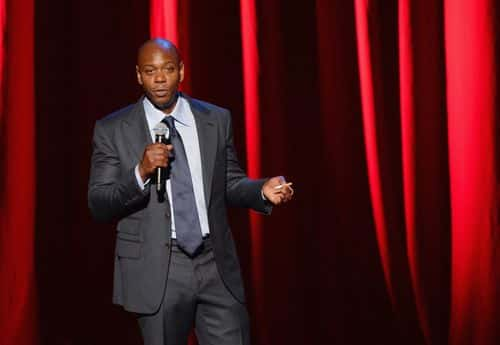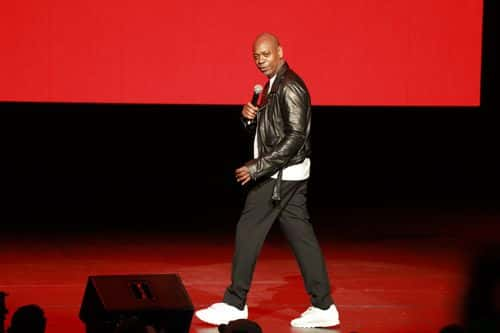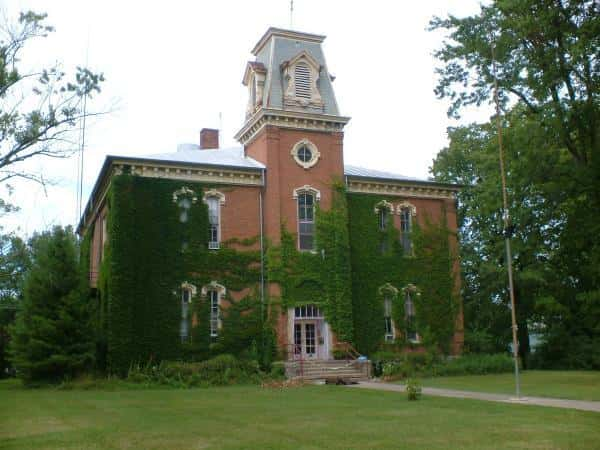Yellow Springs v Dave Chappelle: Neighbors slam 'Trump-like' comedian for buying properties amid shortage

YELLOW SPRINGS, OHIO: It's not difficult to locate America's most isolated comedian. Like any other Yellow Springs, Ohio citizen, Dave Chappelle goes out in the city's center, buys coffee, and shops. In the midst of an ongoing debate regarding the multi-millionaire comedian's real estate acquisitions, Dave Chappelle has been compared to Donald Trump by at least one citizen of his Ohio hometown for his propensity to incite hostility. This comes after he started purchasing land in the 3,700-person town in 2020, and today he owns 20 structures, including homes, businesses, an old fire station, and a former school. Residents are fiercely divided over whether or not he is operating in the best interests of the community, and a series of epidemic concerts both infuriated and delighted them.
Chappelle, 49, grew up in Yellow Springs, Ohio, where he spent his summers with his father albeit being born in Washington, DC. Returning to Ohio in the early 2000s, Chappelle paid $309,000 for a 3,150-square-foot, three-bedroom house on 39 acres in 2005. Some locals called Chappelle "a force that's turning us into the place that we're all trying to stay away from," as per Bloomberg.
READ MORE
LA's new 'mansion tax' prompts Hollywood celebrities to sell their luxury homes valued over $5M
What if Dave Chappelle buys Ohio Town?
Chappelle reportedly enjoys a broad base of support in the community, where his initiatives have benefited several organizations and businesses. The pandemic shows "brought magic and energy at a time when we needed it the most," a company owner and a neighbor named Brittany Baum wrote in a typical statement to the zoning board. Matthew Cole, the only CPA in the region, stated in another letter that "a few local businesses would not exist today if it weren’t for the shows."
"When I look out on the street I see other people of color, I see people of other cultures," says Jamie Sharp, owner of Yellow Springs Toy Co, who grew up in the Hamlet during the same astrophysicist-and-clown era as Brown. The shows allegedly produced $12 million in direct and indirect revenue for the state of Ohio, including $4 million for the town, per a report Chappelle commissioned.

Few people have seemingly taken to criticize Chappelle because of their concern about losing their employees or clients. Off the record, locals of a variety of ages and racial backgrounds claim that Chappelle is "a force that’s turning us into the place that we’re all trying to stay away from."
"Dave’s got to be the biggest contentious thing that I’ve ever seen pit neighbor against neighbor." Someone added, "If you close ranks, and then you decimate anybody that speaks against an idea you have, then how does that inform community, or build community, and how does that save a community?"
Several residents of the village compared Chappelle to former President Donald Trump because of his propensity to, in the words of one, "never apologize, double down, and blame the other person." This year, Chappelle has continued to grab attention. Other locals objected to his acquisition of 20 properties, which included a former school and firehouse as well as shops and houses. Chappelle is aiming to convert a number of them into performance spaces.

Chappelle has continued to grab attention this year. He has made jokes that have hurt sentiments and he has also been attacked during his performance. Netflix employees have boycotted him and of course the Elon Musk onstage debacle in San Francisco. With a few notable exceptions, the majority of Yellow Springers don't appear much concerned about what happens when Chappelle departs town. What one wealthy person is doing with his money and how Hamlet is changing are of more interest to them.
Ohio properties owned by Dave Chappelle
The properties owned by Chappelle range from recently refurbished to almost completely deserted, and they are grouped together along the village's three main thoroughfares. One of Chappelle's most recent acquisitions is a former fire station, which he plans to convert into a comedy club. Three months later, he paid $480,000 for the historic Union School House with the intention of converting the 1872 structure into the headquarters of the neighborhood radio station WYSO. Additionally, he has acquired a sizable number of the town's office and residential buildings.

When he declined the chance to purchase 53 acres of land adjacent to his property in November 2020, a local homebuilder, Oberer Land Developers, purchased the land for $1.7 million. The Smoking Octopus, which offers Chappelle products, is also owned by him. According to Bloomberg, Oberer collaborated with the village of Yellow Springs to create a housing complex that would have 64 single-family homes, 52 duplexes, and 24 townhomes, with prices beginning in the mid-$200,000s.
Chappelle started holding events in the Wirrig Pavilion, a wooden gazebo that is situated on 34 acres of grass and woods, during the pandemic. The use of the agricultural area for shows was criticized by some neighbors, and several council meetings were convened as a result.
What did Chappelle say about his Ohio stay?
Chappelle appears to be aware of the benefits and drawbacks of his reputation in Yellow Springs. When performing on 'Saturday Night Live' in 2020, he envisioned a local calling out, "Honey, come quick, come quick, the guy from the grocery store is on television!" In answer, Chappelle said, "No, you big dummy, the guy from television is at the grocery store."
If he hadn't been the person from television initially, he most certainly couldn't have performed his acts in the cornfields. Chappelle’s spokesperson, Carla Sims, emphasizes that Chappelle should be given the same right to privacy as any other citizen while talking about his real estate acquisitions. She claims that none of his neighbors have had news conferences to discuss what they are doing with their personal property.










